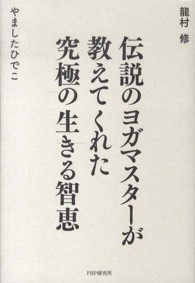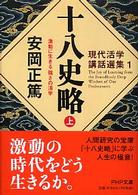- ホーム
- > 洋書
- > 英文書
- > History / World
Full Description
The Filthiest Village in Europe traces how a community shrouded by "industrial fog" at the brink of gaping coal pits became a symbol that galvanized grassroots ecology: campaigns by diverse local actors that exposed environmental and economic crises East Germany's political system could not resolve. Notorious by the late 1980s as "the filthiest village in Europe," Mölbis suffocated downwind from the massively polluting carbo-chemical Espenhain plant. Applying a myriad of private collections, interviews, and untapped archival sources, Andrew Demshuk reveals how pastors, parents, officials, inspectors, workers, and spies negotiated ossified party structures whose inability for reform was showcased by ever-worsening environmental conditions.
After peaceful protests a few kilometers north in Leipzig triggered the revolution, pre-1989 grassroots players launched innovative reconstruction programs with financial and organizational expertise from West Germans. Together, they transformed Europe's filthiest village into a healthy place to live and imbued it with new symbolism: as a sign of hope. The political will and social engagement that saved Mölbis and rejuvenated the surrounding wasteland can inform how to revitalize other postindustrial "filthy places" in our world today.








